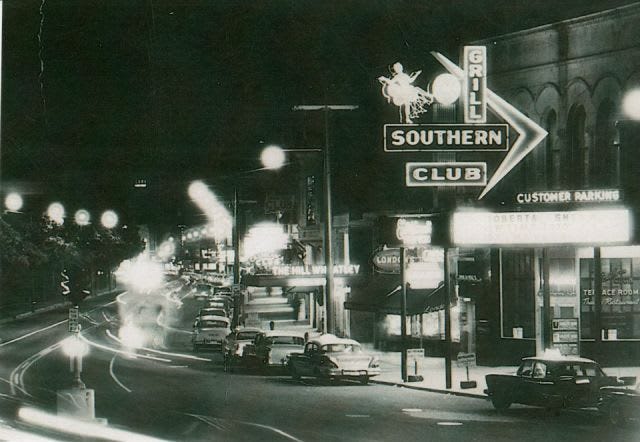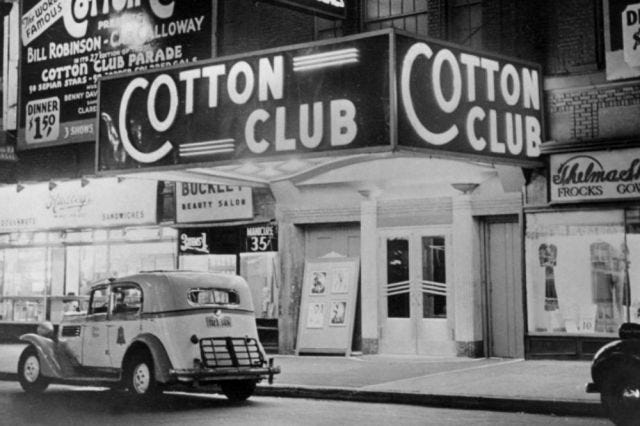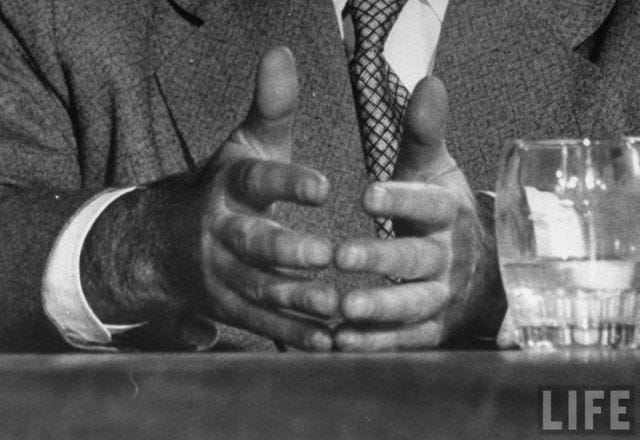Not all tidings are good, nor yuletides gay

For Christmas 1953 the owners and employees of the Southern Club, a large illegal casino in downtown Hot Springs, placed an ad in the Hot Springs Visitor's Bulletin wishing their guests a Merry Christmas. The Bulletin was distributed across the country as a way to drum up out-of-state tourists to the Spa. The Southern Club was happy to assist. They had suffered through periodic police raids and shutdowns, at their club and at others throughout the city, since Hot Springs had been going through what the Sentinel Record had called "The Gambling Wars."
It all started on Christmas Day in 1940, when W.S. Jacobs, the Boss Gambler of Hot Springs, passed away unexpectedly. As Boss Gambler Jacobs was tasked with keeping the peace between various club owners and gamblers, as well as coordinating with the elected officials and law enforcement agencies who were important to keeping the illegal gambling business open for business. After Jacobs died, Mayor Leo P. McLaughlin appointed a former doorman from the Southern Club, Jack McJunkins, as the new Boss Gambler. McJunkins hadn't ever been involved in operating gambling clubs before. Many figured him to be a puppet that would enable McLaughlin to lord over gambling on his own without rivals.
McJunkins and McLaughlin's tenure at the reigns of gambling was a miserable failure. While Jacobs kept a firm grip on who could operate and who couldn't, McLaughlin and McJunkins let the gates swing wide open. During the 1940s a flood of new clubs appeared, new bookmakers opened up shop, and word got around the country that Hot Springs had loosened the restrictions on who was allowed to operate. Con artists, cheats, drug dealers, pimps, and all sorts of unsavory characters who had previously been unwelcome in Hot Springs started showing up. It was in this context that the G.I. Revolt took place in 1947, the group of WWII veterans who took control of the city after the war and sent McLaughlin packing after twenty years in office.
The Gambling Wars were sparked by a judge named Floyd "Babe" Huff deciding to make a move to be Boss Gambler by demanding 20% of the profits of every gambling joint in town. Factions organized around him and those who opposed him, each holding influence over one judge or law enforcement agency or another, and the different factions spent the early 1950s taking turns shutting each other's clubs down. At one point they even called in Frank Costello to try to sort it all out, maybe even to become the Boss Gambler of Hot Springs himself.
In 1951 Frank Costello had been labeled by Senator Estes Kefauver as the top gangster in the country, as well as the man who was controlling City Hall in New York City. Among his considerable financial interests were a number of businesses and real estate holdings in Hot Springs, as well as a stake in nearly every slot machine used in the city. Costello frequently vacationed in Hot Springs and was rumored to be bankrolling Jack McJunkins in many of his endeavors behind the scenes. When Costello came to town he met with dozens of citizens to hear them out on how the "Gambling Wars" were effecting them. He held court in a suite at the Jack Tar Motel and heard from casino owners, politicians, even cab drivers who encouraged him to come fix the disfunction in the Hot Springs combination.
Floyd Huff wasn't having it. He railed in the press against Costello and any other out-of-town gangster from coming to Hot Springs to try to get involved in the gambling business. Publicly Huff argued that the town needed to stay in local hands and that mobsters would corrupt the enterprise. Privately Huff was employing former gangster Dick Galatas, mastermind of the Kansas City Massacre of 1933, to help him enforce his rule in Hot Springs, and would later bring Chicago Outfit hitman Ralph Pierce to Hot Springs to help him as well. Huff's real interest in keeping Costello out was Costello's alliance with a prominent Hot Springs resident named Owney Madden.

Madden was once a top New York gangster during Prohibition. He was the owner of the Cotton Club in Harlem, a manager of World Champion prizefighters, and a companion to celebrities like Mae West and George Raft. He had murdered no fewer than six men, and had nearly been murdered himself, with the bullet shrapnel lodged in his belly to prove it. Madden had retired to Hot Springs in the early 1930s after a stint in prison in New York. He had been suspected by law enforcement of being the mob's man in Arkansas and the connection between the gambling combination in Hot Springs and the nationwide crime syndicate headed up by Costello, Meyer Lansky, and other top hoodlums. So far, however, the FBI and the Senate rackets investigators hadn't been able to pin Owney Madden down. He kept a low profile and told anyone who asked that he was "retired."
Huff hated Madden, mainly because Madden refused to pay him his twenty percent and had backed Lloyd Darnell to run against Huff in the 1952 election. Darnell lost that election, and the struggle between Madden and Huff lead to many of the clubs and the entire race wire service that supplied results to the city's bookmakers to be shut down. Their war spilled over into New Orleans, where Huff sent Galatas to go put the squeeze on Carlos Marcello's bookies that did business with Madden. And the Senate committee caught wind of it, with their chief counsel Robert Kennedy hot on the trail of trying to prove that Owney Madden was controlling gambling in Hot Springs and serving the interests of national crime figures like Frank Costello. When Costello went before the Kefauver committee to testify, the entire nation tuned in to watch it broadcast live on television. Costello refused to let the cameras record his face, so viewers watched a tight shot of his hands as he answered questions like "Who owns the Southern Club in Hot Springs?" Costello bobbed and weaved their inquiries. But when Christmas 1953 rolled around, Owney Madden spilled the beans on himself. When their advertisement wishing their guests a Merry Christmas went out, shipped all across the country, Madden's name was listed alongside the other owners.

The head of the FBI, J. Edgar Hoover, used this advertisement to put pressure on his agents in Arkansas to step up their efforts in surveilling Madden. And as Huff grew more powerful, he went to greater lengths to push Madden out of the gambling business entirely. By the late 1950s Huff would be mostly successful, save for Madden's ownership of the all-important race wire service. For his part Owney Madden had contemplated killing Huff. Instead he chose to redouble efforts to beat him at the ballot box, raising over a quarter of a million dollars from his partners to fund opponents to Huff and his allies. This effort would solidify the faction that would eventually control Hot Springs and bring the good old days back. More importantly, Huff's exit from political life and Madden's return to prominence would pave the way for the opening of The Vapors in 1960.
But the FBI, the Senate Committee on Investigations, and Robert Kennedy would never let up their efforts to break the Hot Springs gambling combination. Eventually they would succeed, but not before Owney Madden passed away of natural causes. While writing this book I'm often surprised at how many seemingly unrelated and insignificant events combined to form the perfect storm that ended the gambling business in Hot Springs and helped the gambling business in Las Vegas thrive. This is just such an event. If not for Owney's desire to wish his guests a Merry Christmas in 1953, who knows how different a future Hot Springs may have had?
Seasons Greetings,
David
P.S.
I haven't written in a while because I've been hard at work trying to rewrite my book. I never thought that writing a book would be easy, but I also didn't anticipate just how hard it would be. I'm often asked when it is coming out, and some days that question really puts me in a dark place. I had hoped I'd be finished by now. But I'm not. I do hope to have it done soon, though. In addition to how eager I am to share it with the world, I'm also eager to start work on new projects I want to do next.
One thing that really makes the work go slow is the fact that I am back in New York, a considerably more expensive place to live than Arkansas, and so I have to do more freelance writing to make ends meet. I enjoy freelancing, but it does take me away from The Vapors more often than I'd like it to. But so long as I'm writing about other stuff, you may as well read it. So allow me to link you to some of my recent work you can enjoy over this holiday break.
I wrote about the littlest chess players for The Ringer. Readers of this tinyletter will remember that I covered some of these topics in a previous letter back in August about Bobby Fischer's visit to Hot Springs. If you're a recent subscriber, you can find that letter here. It was cool to get a chance to write about chess for a larger audience, and especially to work out a lot of my weird feelings about Gus playing in chess tournaments.
Thrillist sent me to Las Vegas back in October to write about guns and video games. I was there to watch the Big Buck Hunter World Championships, but also to see Vegas in the aftermath of the massacre at the Route 91 Harvest Festival. It ended up being a very long piece and maybe one of the weirdest things I've ever written. But I spent a lot of time working on it so please share it if you enjoy it.
Montana Public Radio played a recording of a story I wrote about Christmas in Hot Springs in 1993. That story will replay at midnight on Christmas Eve during the WPRB 25 Hour Christmas Marathon. You can listen to it streaming on the web. They are also going to play another Christmas story I wrote, one that was played on the NPR show Snap Judgement, also from my childhood in Arkansas. I have no idea what time that one will air. So you'll just have to listen to the whole 25 hours. Or you can just listen to it at this link at your leisure.
My hope is to use twitter a lot less in 2018, but just in case I break that resolution, you should give me a follow just to be safe.
If you're wondering what you could give me for Christmas that would make me the happiest of all of the tinyletter writers you subscribe to, it would be that you share my tinyletter with your friends and family and encourage them to subscribe. If they do, I'd probably get back to writing these once a month again.
Thank you for subscribing and coming along with me through all of this so far. Happiest of holidays and here's to a hopefully brighter new year than the last.


